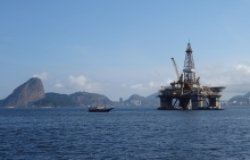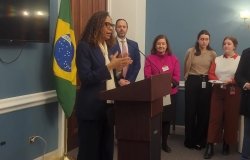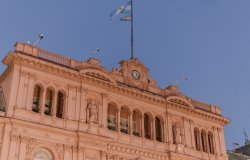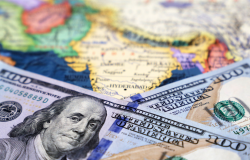
A blog of the Brazil Institute
New Sea Law Could Revolutionize Protections in Brazil's Coastal Areas

Ministry of the Environment / Agência Brasil
At over 8,000 kilometers long, Brazil has the second-largest coastline in Latin America. However its picturesque coastal landscapes are under threat from uncontrolled urban growth, pollution, deforestation, and a host of other problems. These factors, along with constantly intensifying climate change, could profoundly change the way of life of the forty-two million Brazilians who live in coastal regions.
Against this backdrop, Brazil's Congress is attempting to pass Bill 6969—the so-called ‘Sea Law’—which would establish the National Policy for the Conservation and Sustainable Use of the Brazilian Marine Biome (PNCMar). After stalling for six years, the bill was slated for approval in August but the session ran out of time. It would have been the first proposal of the 'green agenda' to make it to a floor vote in the House of Representatives this year.
In fact, Congress is teeing up a series of these so-called ‘green votes,’ with bills related to the carbon credit market, climate change, and, above all, fighting deforestation. The latter is seen as the most important legislative proposal for environmentalists and agribusiness sectors.
This move toward approving environmental legislation is Congress’ message to the Jair Bolsonaro administration and the mounting criticism it has received for its perceived neglect of the Amazon Basin. In June, House Speaker Rodrigo Maia set up a working group among lawmakers to discuss green proposals. The group recently indicated it would send six proposals to Maia for consideration by the Chamber.
Between August 2019 and July 2020, deforestation in the Amazon grew 34 percent in relation to the previous twelve months, according to data from the National Institute of Space Research (Inpe).
As The Brazilian Report has covered in the past, the Brazilian government is accused of doing nothing to avoid damage to the environment, and even encouraging deforestation and other criminal activities in the Amazon.
Expanded Protections
The rapporteur of the Sea Law, federal lawmaker Túlio Gadelha, says that the bill includes “important principles” which can innovate management and establish a system of “marine space planning,” he tells The Brazilian Report.
Mr. Gadelha also noted that the law is the result of the efforts of civil society, based on technical and scientific studies. “The main legal framework for coastal management is from 1988, it came with the Constitution, when the level of information available about the sea was very different,” he says.
The Sea Law covers the Brazilian Marine Biome, which is defined as the ensemble of marine ecosystems in coastal zones, the continental shelf, islands, and the deep sea. If approved, the legislation would have legal mechanisms to protect environments such as Brazil's territorial waters and exclusive economic zone, estuaries, coastal lakes, rivers and channels, mangroves, tidal marshes, dunes, and other similar areas.
The proposal involves the creation of indicators of quality and environmental health, as well as the Marine Space Plan to distribute the activities of the population in the biome. This policy will be financed by way of public and private funds, as well as environmental compensation paid by undertakings that cause damages to the sea.
International Agreements
The proposed new legislation was the subject of an online debate organized by the Environmentalist Parliamentary Front. The Sea Law intends to be in sync with international accords to preserve the ecosystem, such as the Sustainable Development Goals of the United Nations.
However, Leandra Gonçalves, researcher of the Oceanographic Institute of the University of São Paulo, highlights that the legislative proposal could be improved. “When the bill was discussed, the oil spill in the Northeast had not happened. We can learn something from this situation to make this law something more innovative, up to date, and legitimate to allow us to have coastal governance in Brazil.”
Marcia Hirota, executive director of environmentalist NGO SOS Mata Atlântica, adds that the involvement of states and municipalities is of utmost importance. “The country developed with its back to the sea. It's not possible for us to fail to reconcile the conservation agenda and the uses [of the biome], and above all, to make it so that the people who live in these regions or adore the sea may also work toward the development of the country in these regions.”
Like the content? Subscribe to the Brazilian Report using the discount code BI-TBR20 to get 20 percent off any annual plan.

About the Author

The Brazilian Report
Read More
Brazil Institute
The Brazil Institute—the only country-specific policy institution focused on Brazil in Washington—aims to deepen understanding of Brazil’s complex landscape and strengthen relations between Brazilian and U.S. institutions across all sectors. Our mission is to provide thoughtful leadership and innovative ideas to help democracies evolve and enhance their capacity to deliver results. We achieve this by producing independent research and programs that bridge the gap between scholarship and policy, while serving as a hub for policymakers, scholars, and private sector leaders. Read more










